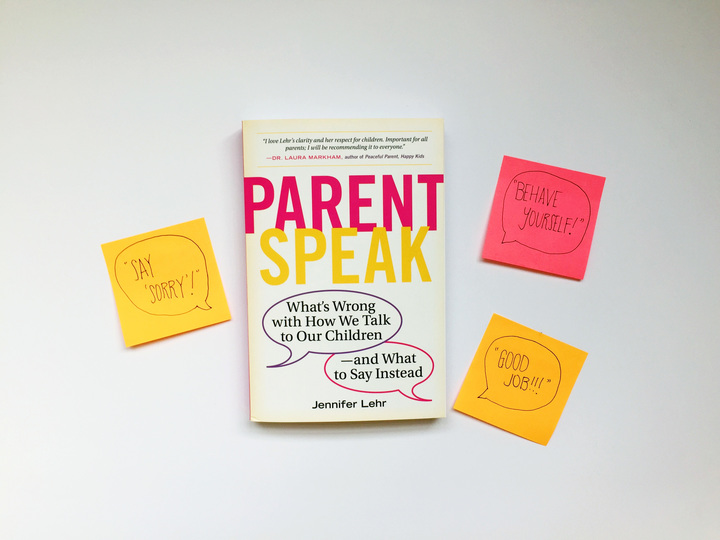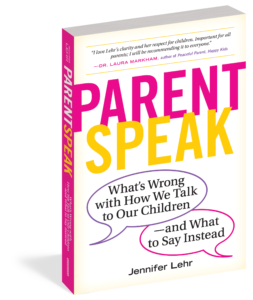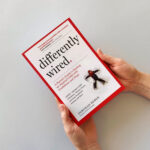We asked Jennifer Lehr, author of ParentSpeak, to provide weekly parenting challenges this month, highlighting the hidden dangers the seemingly innocent phrases parents use when speaking to their young children. By participating in the challenges, we hope you’ll get a better understanding of Lehr’s conscious approach to parenting based on respect and love for the child as an individual.

ParentSpeak Challenge #1: Stop Saying “Good Job!” for a Week
“Good job!” has become nothing short of the signature phrase of the modern parent, teacher, nurse, babysitter, or anyone who comes in contact with a child for that matter.
We say it to be encouraging, like when our kid do a cartwheel.
“Good job!”
To express pride, like when they score a goal.
“Good job!”
To let them know we enjoy their work, like when they show us a painting.
“Good job!”
We say it to express our amazement, like when they hold still for a shot at the doctor’s.
“Good job!”
To express our appreciation, like when they clear the table.
“Good job!”
We say it to show them how pleased we are when they do what we want, like when they clean their room.
“Good job!”
Don’t you think it’s kind of amazing that we use the same two, profoundly generic words to send such a variety of messages? And “Good job!” isn’t just generic, but it’s inherently and unnecessarily judgmental. As the psychologist Robin Grille explains, “The use of praise or rewards does not make children feel supported. It makes them feel evaluated and judged.” Because if something isn’t good, if it doesn’t get a “Good job!” what is it? Bad? Not up to snuff? Grille continues, “Rewards and praise condition children to seek approval; they end up doing things to impress instead of doing things for themselves.”
What if we stopped saying “Good job!” altogether, what might we say instead?
OBSERVE
When your kids master something they’ve been working on, let them know you’ve been paying attention and are interested in their experience. “You’ve been working on your cartwheels for weeks. Now your legs are so straight! How does it feel?” I know that often just as I’m about to “good job” my son’s flip, he’ll say, “That one sucked!” He has a very clear sense of what he’s trying to achieve. He just wants me to see what he can do! He wants to share his passion and progress.
CELEBRATE
If your kid scores a goal, they already know they’ve done a good job! They don’t need us to tell them. Our job is to celebrate right along with them. “Congratulations! I’m so happy for you! That was so exciting to watch!”
ACKNOWLEDGE
If they hold still for a shot at the doctor’s, say something like, “I know you were so scared the shot would hurt and yet you were able to hold still for the nurse which made her job so much easier. I know that was hard. You were very brave.” And if your child wasn’t able to “do a good job” and hold still, there’s nothing wrong with that either. “I know it’s so hard to sit still when you’re so scared.” We don’t want our kids to feel we’re more proud of them when they make our lives easier.
APPRECIATE
And when they clear the table? A simple “Thanks for help!” does the trick. It feels better to have your efforts appreciated than evaluated. I mean, after all, most kids above a certain age are pretty adept at pick up a plate and glass and placing it in the sink. We don’t mean that they’ve done a good job, we mean thanks for participating in the clean up (i.e. I feel less taken for granted!)
DESCRIBE AND ASK
And when they show you us their art work, I find that describing what I’m seeing and asking about it is the gift that keeps on giving. “I see you used a lot of red and pink! Can you tell me about the shapes in the corner.” I’m often surprised by the stories and details I learn when I show interest and ask questions. It’s far more fascinating and connecting than me telling my kids how good I think their artwork is.
Don’t get me wrong, “Good job!” is a hard habit to break. The first step is just to become aware of how often you say it. I’ll tell you, today, many years after my initial attempt to retire “good job” from my vocabulary, I actually find I can’t even bring myself to say it. Admittedly, it’s an extreme reaction to two innocent congenial little words. But I don’t miss them. Not only does their predictability drive me a little insane, but I know that trapped inside them is so much substance, connection, and gratitude waiting to get out.
 About the Book:
About the Book:
A provocative guide to the hidden dangers of “parentspeak”—those seemingly innocent phrases parents use when speaking to their young children.
Imagine if every time you praise your child with “Good job!” you’re actually doing harm? Or that urging a child to say “Can you say thank you?” is exactly the wrong way to go about teaching manners? Jennifer Lehr is a smart, funny, and fearless writer who “takes everything you thought you knew about parenting and turns it on its ear” (Jennifer Jason Leigh).
Backing up her lively writing and arguments with research from psychologists, educators, and organizations like Alfie Kohn, Thomas Gordon, and R.I.E. (Resources for Infant Educarers), Ms. Lehr offers a conscious approach to parenting based on respect and love for the child as an individual.
Buy the Book
Amazon | B&N | Indiebound | Workman





No Comments